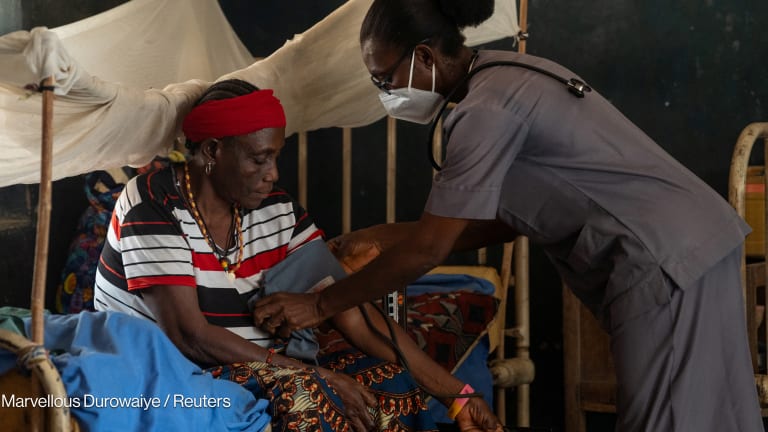
LONDON — The United Kingdom’s Department for International Development launched its first disability strategy Monday, which disability champions hailed as “ambitious” but in need of dedicated financing to implement.
The plans cover disability inclusion both in DFID’s external programs and within the department, fulfilling a key commitment made by Secretary of State for International Development and former minister for people with disabilities Penny Mordaunt.
Disability groups said they were pleased to see a focus on issues such as “mental health conditions, psychosocial or intellectual disabilities,” as well as inclusion in humanitarian contexts included in the strategy. However, implementing it will require dedicated funding from DFID, advocates said.
New Devex series: Development Enabled
Development Enabled explores the daily challenges of people with disabilities while looking at solutions on how to support a disability-inclusive world.
In a statement sent to Devex, the co-chairs of the disability and development working group at Bond, a network of U.K. aid NGOs, said:
“The strategy sets out lots of areas where DFID have high levels of ambition … It much more clearly recognises that people with disabilities are diverse and experience intersecting forms of discrimination and sets out a much stronger commitment on gender than we have seen before.”
However, the co-chairs — Hannah Loryman, policy adviser at Sightsavers; Lucy Drescher, head of parliamentary advocacy at Results; and Tamsin Langford, head of programs at Motivation — also warned that it needs to be accompanied by more funding.
“There needs to be the right level of resourcing in place … to ensure that disability inclusion is budgeted and planned for across [DFID’s] programming and is not confined to flagship programs on disability or written in to programs ad hoc,” they said.
Approximately 15 percent of the world’s population has a disability but campaigners say they are systematically excluded from health, education, and other services. The issue has been rising up the global agenda in recent years and has been a priority for DFID under Mordaunt’s leadership.
The U.K. and Kenya co-hosted an International Disability Summit in July, during which Mordaunt pledged to develop a “more structured framework” outlining how DFID would make good on its promise to ensure disability is “embedded in everything we do.”
The resulting five-year strategy has four focus areas for achieving disability inclusion — education, social protection, economic empowerment, and humanitarian action — chosen because they are areas where DFID has a “comparative advantage and global influence,” according to the document. The strategy also outlines three cross-cutting areas: tackling stigma and discrimination; empowering girls and women with disabilities; and access to appropriate assistive technology.
DFID also said it plans to increase its focus on mental health, describing it as “a too-long neglected issue in international development.”
Introducing the strategy, Mordaunt pledged to “[get] my own department in order,” following criticism from the aid watchdog earlier this year for not doing enough. That will include a new set of standards requiring all DFID business units to “change culture and practices, engage meaningfully with disabled people’s organizations, influence others, adapt programs and collect disaggregated data,” Mordaunt wrote.
A new disability inclusion delivery board made up of senior DFID staff, will oversee the implementation of the strategy and will publish annual progress reports.
“If DFID meets these standards by the end of next year, which is what they have committed to, then DFID will be in a much better place in terms of mainstreaming disability inclusion,” the Bond working group co-chairs said.
Nicola Jones, principal research fellow at the Overseas Development Institute, also welcomed the focus on disability inclusion in humanitarian settings that she said could be a “real game changer” since the subject “hasn’t been on the radar for many agencies.”
However, some important issues are not covered by the strategy, experts added.
According to Jones, the strategy said surprisingly little about access to health care, including sexual reproductive health services, for people with disabilities. She had also hoped to see more about reaching adolescents and about support for carers, who can often face stigma and a lack of support themselves, Jones said.
Rachel Aston, policy manager at the disability NGO CBM, said the department should “put more thought” into working with organizations for people with disabilities. “The strategy talks about consulting with DPOs [disabled people’s organizations], which is good, but ... DPOs need to be setting the agenda,” Aston told Devex.
Advocates had also raised the issue of financing at the time of the July summit, which elicited around 170 commitments on disability inclusion but few funding pledges.
“We need to speak out about the need to put money where the promises are,” Jones said.
DFID had not responded to a request for comment at the time of publication.
Update, Dec. 4, 2018: This article has been updated to clarify that the United Kingdom and Kenya co-hosted an International Disability Summit in July 2018.
For more coverage on creating a disability-inclusive world, visit the Development Enabled series here.

Search for articles
Most Read
- 1
- 2
- 3
- 4
- 5








